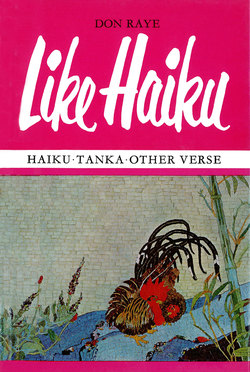Читать книгу Like Haiku - Don Raye - Страница 9
На сайте Литреса книга снята с продажи.
ОглавлениеINTRODUCTION
Form is, in itself, subordinate to the expression within it. However, as a writer of song lyrics for many years, my writing has been dictated by form; the setting of words to established notes—of telling a story within a given number of bars of music. It is a discipline I have had to live with but have come to enjoy, and even found inspirational at times.
Perhaps this is why I have always been fascinated by the Japanese poetic forms of choka, sedoka, tanka, katauta, and haiku which, in their own way, are just as demanding. Haiku have become a personal enjoyment to me—something of a game—to crystallize an unique observation with a few syllables. When it works, I feel like a little God for a moment.
Traditionally, a haiku is a three line poem of seventeen syllables divided into five, seven, and five syllables. In Japan it usually has a seasonal connotation such as "cherry blossoms," "dragonflies," "fallen leaf," "bitter wind." Presumptuously, I don't think haiku has to be clocked with pillow words.
The bright little kingfisher in the kakemono on my wall is standing atop a broken bamboo shaft sticking out of the water. His head is twisted over his back, one prehensile claw raised tensely. What is it? A juicy meal buzzing around him? Something stalking him? Or is he wondering, "Where the hell is Mrs. Kingfisher?" I make an addition to my story every time I look at it. That, to me, is a good haiku—a line drawing, an unfinished statement left for me to color if I care to. For what is not stated may be full of implication, a more profound something than appears on the surface. An interested reader will personalize what he reads and let it happen to him.
These word sketches of mine are not haiku in the true sense. They are "like" haiku. An Occidental songwriter's haiku. I have merely used that stringent form to frame my own pictures of wonder, my moments of awareness of those things which have made me feel.
Some, perhaps, may be platitudinous, some abstruse to a reader who has not shared with me an exquisite flick of emotion at a sight or a sound. But no matter. Life is not a minted coin, heads and tails, for anyone. It is a personal pastiche— nuances between sunrise and sunset, stormy or serene, comic or sad. It's all to be viewed in one's own kaleidoscope.
—DON RAYE
